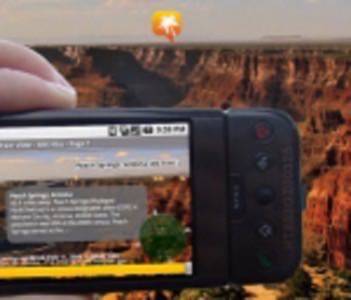This year has seen an explosion in the development of mobile augmented reality applications, from games and parlor tricks to incredibly useful applications that provide more information about the world around us.

Today, Austrian smartphone development shop Mobilizy, creator of the Wikitude World Browser, has announced it will be presenting a standard AR markup language (ARML) to the the AR Consortium. Such a step would remove one of the five barriers to AR that we recently wrote about: interoperability. Cross-platform, open development standards would allow users more ways to see more AR content. Read on for a video and details.
Establishing an open ARML specification will allow users to access any AR data in the physical world from any AR browser. It will also accelerate innovation and allow for more, better, and less expensive AR apps.
In our recent post on barriers to mobile AR, Marshall Kirkpatrick wrote, “Right now you cannot see information from the Wikitude AR environment if you’re looking through the Layar AR browser. This could be the coming of a new browser war just like that of the 1990s… A lack of interoperability between AR environments would be a tragedy of the same type as if the web had remained defined by the islands of AOL and Compuserve or Internet Explorer, forever.”
Layar, Mobilizy’s biggest competitor in the AR space and who just today announced the addition of a 3D interface to its platform, has spoken publicly about interoperability in the past. Layar’s co-founder Maarten Lens-Fitzgerald told us, “The lock-ins and exclusivity won’t work. Openness and interoperability are where it’s going; we’re going to discover how exactly with other people…That’s where it’s going: control to the user.”
The basic idea of the ARML specification is that the data can be viewed on any augmented reality browser but also in Google Earth. Augmented reality browsers can include an open URL dialog where the user can enter an URL pointing to a valid ARML document, and users can then easily bookmark those URLs. The markup language is based on KML, Google’s Keyhole Markup Language for mapping applications that was just turned over to the Open Geospatial Consortium last year.
Here’s a video from Wikitude explaining more:
Features of the proposed specification include the following:
- Founded upon KML with extension name-space for AR specific data;
- Placement of a “View in AR” icon which clearly identifies a mobile
- website that supports location aware (real time) data in an ARML
- browser;
- Compliance with basic XML document structure – no proprietary
- programming API required to create an AR layer.
- ARML adherent data can be viewed on ARML browsers (e.g. Wikitude)
- and KML browsers (e.g. Google Earth);
- Custom styling of AR data (points of interest) via standard KML
- styling elements; and
- Initial support for UTF-8 encoding.
Mobilizy is offering limited access to the preview version of their upcoming ARML browser. Interested parties and developers with questions about the ARML specification should email Mobilizy.





















